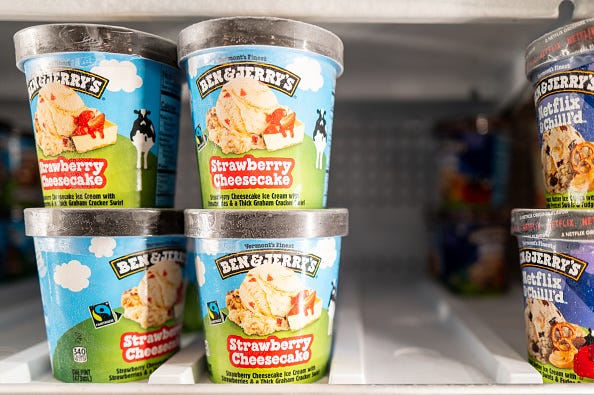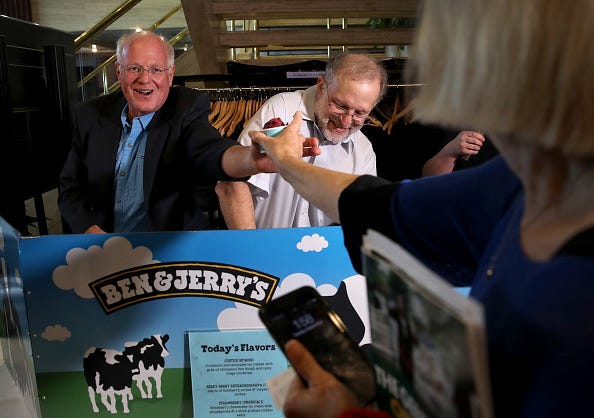Ben Cohen wants to make a new ice cream flavor, even if his iconic ice cream brand’s parent company doesn’t. He also wants the public to help.
“Unilever/Magnum stopped Ben & Jerry’s from creating a flavor for Palestine – so I’m doing it myself,” said Ben & Jerry’s co-founder Ben Cohen in a Tuesday X post. “I’ve got a watermelon, an empty pint, and I need your help: Name the flavor or suggest ingredients. Or design the pint packaging Tag.”
Most people who have spent any time on social media over the past two years probably know that watermelon is a symbol for Palestinian support. According to NPR, this use of watermelon seems to have come after public displays of the Palestinian flag were outlawed in Israel following the Arab-Israeli war in 1967.
Per the outlet, renowned Palestinian artist Sliman Mansour said the idea of the watermelon’s connection with the Palestinian flag came from an Israeli soldier who was trying to censor his gallery in the 1980s. Mansour said that solider threatened to confiscate any art with the Palestinian flag’s colors (black, red and green) – even a watermelon.
How did things get to the point where Cohen is working on the flavor himself and calling out corporations on X? For reference, Unilever announced a de-merger with The Magnum Ice Cream Company this year.
Let’s go all the way back to Ben & Jerry’s 1978 founding by Cohen and Jerry Greenfield in Burlington, Vt. They had just a $5 correspondence course in ice cream-making from Penn State and a $12,000 investment when they started. Both were also filled with a passion for activism that continued as their company grew.

Over the years, the pair have created flavors and done promotions in support of various issues, including climate action, LGBTQ+ rights, Black Lives Matter and more. In 2021, they announced that they would stop sales in Occupied Palestinian Territory (OPT) as defined by the United Nations.
“We have a longstanding partnership with our licensee, who manufactures Ben & Jerry’s ice cream in Israel and distributes it in the region. We have been working to change this, and so we have informed our licensee that we will not renew the license agreement when it expires at the end of next year,” said a notice from Ben & Jerry’s. Through another agreement, the ice cream was still sold in Israel.
The notice also said selling ice cream in the occupied areas did not align with its values. In a FAQ section, it also addressed concerns about antisemitism.
“We reject and repudiate all forms of hate and racism. Our decision to exit the OPT was based on our belief that it is inconsistent with our values for Ben & Jerry’s to be present within an internationally recognized illegal occupation,” it said. “Speaking and acting on our values is neither anti-Israel nor antisemitic.”
In an opinion essay for the New York Times, the pair also said: “It is a rejection of Israeli policy, which perpetuates an illegal occupation that is a barrier to peace and violates the basic human rights of the Palestinian people who live under the occupation. As Jewish supporters of the State of Israel, we fundamentally reject the notion that it is antisemitic to question the policies of the State of Israel.”
However, this activist move didn’t go as smoothly as some of Ben & Jerry’s past efforts. According to freebenandjerrys.com, Unilever sold its ownership of Ben & Jerry’s in Israel to its former licensee, effectively “overruling Ben & Jerry’s and its independent board,” and continued to sell in the Palestinian Occupied Territory.
In 2022, the independent board sued Unilever over the issue. Then, in 2023, Ben & Jerry’s was blocked from calling for a ceasefire in Gaza after Hamas’ terrorist attack kicked off the Israel-Hamas war, per the freebenandjerrys website. It said more efforts to advocate for Palestinian refugees were silenced in 2024.
Tensions and disagreements over Israel and Palestine continued through this year. Disagreements on other issues followed, including Ben & Jerry’s criticism of President Donald Trump and its statements about Black History Month and diversity, equity and inclusion (DEI) programs.

Former Ben & Jerry’s CEO David Stever, described on the website as “a mission ally” was removed in March “with no consultation with the independent board.” Last month, Greenfield resigned.
“What has made their work so important to me – and what allowed the company to be more than just an ice cream company – was the independence to pursue our values which was guaranteed when Unilever bought the company,” he said. “For more than twenty years under their ownership, Ben & Jerry’s stood up and spoke out in support of peace, justice, and human rights, not as abstract concepts, but in relation to real events happening in our world. That independence existed in no small part because of the unique merger agreement Ben and I negotiated with Unilever – one that enshrined our social mission and values in the company’s governance structure in perpetuity. It’s profoundly disappointing to come to the conclusion that that independence, the very basis of our sale to Unilever, is gone.”
Earlier this month, the Trump administration announced the Trump Peace Agreement and a ceasefire in Gaza. Cohen said in a video posted to X that: “You know, the scale of suffering of the Palestinian people over the last two years has been unimaginable. So, the ceasefire is a welcome relief, but there’s much more work to do rebuild. Palestinians are still living under occupation, still recovering from years of suffering – especially Palestinian children. They deserve dignity, safety and the same rights that every human being should have.”
Airstrikes this week that killed more than 100 Palestinians now threaten the ceasefire agreement, Axios reported. It added that the Israeli military said Wednesday that it would resume compliance.
So, that’s where we find Cohen on his watermelon ice cream mission.
He’s also asked fans of the brand and anyone interested to tell Magnum to “free Ben & Jerry’s” – a pre-written message is available on the site of the same name.
